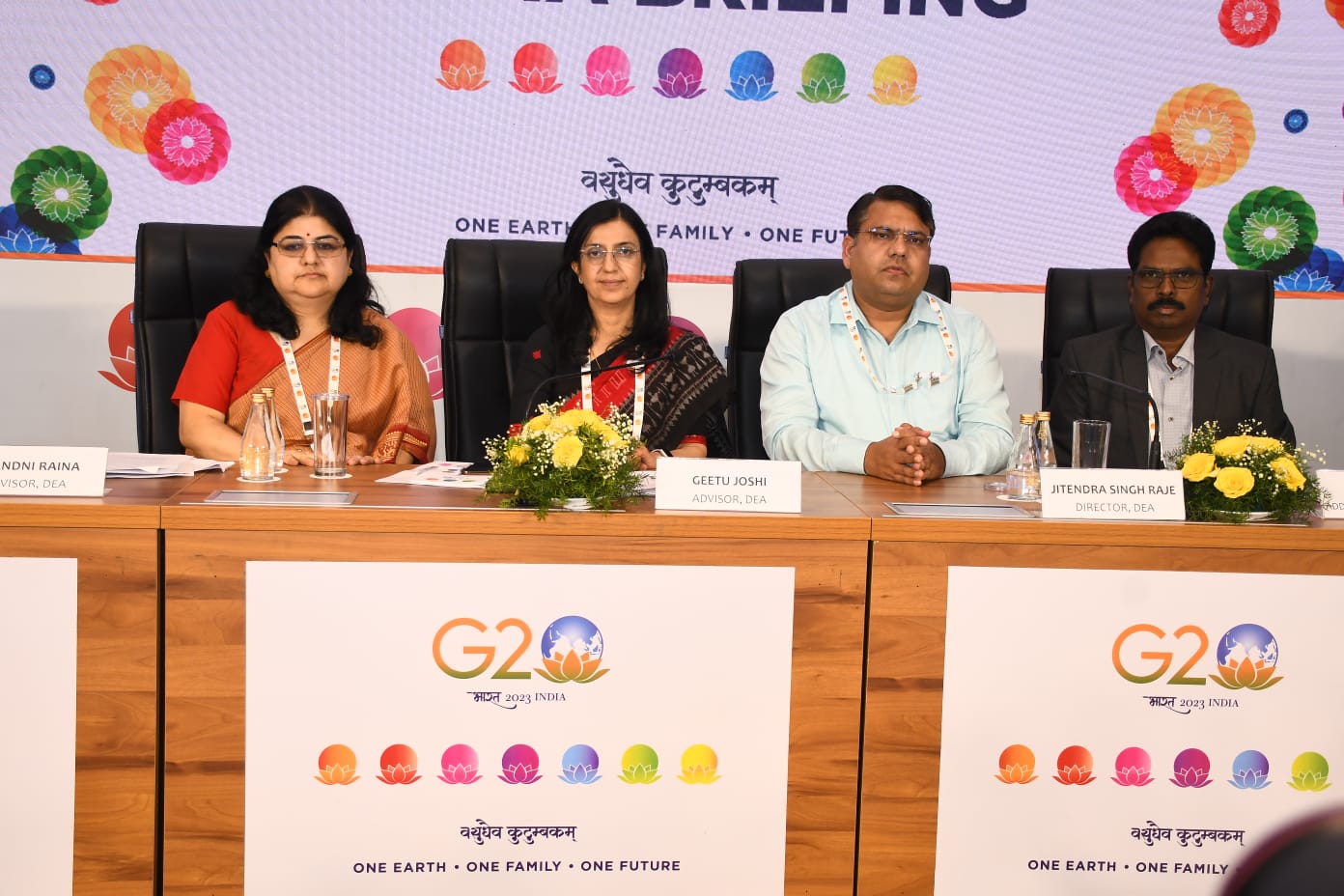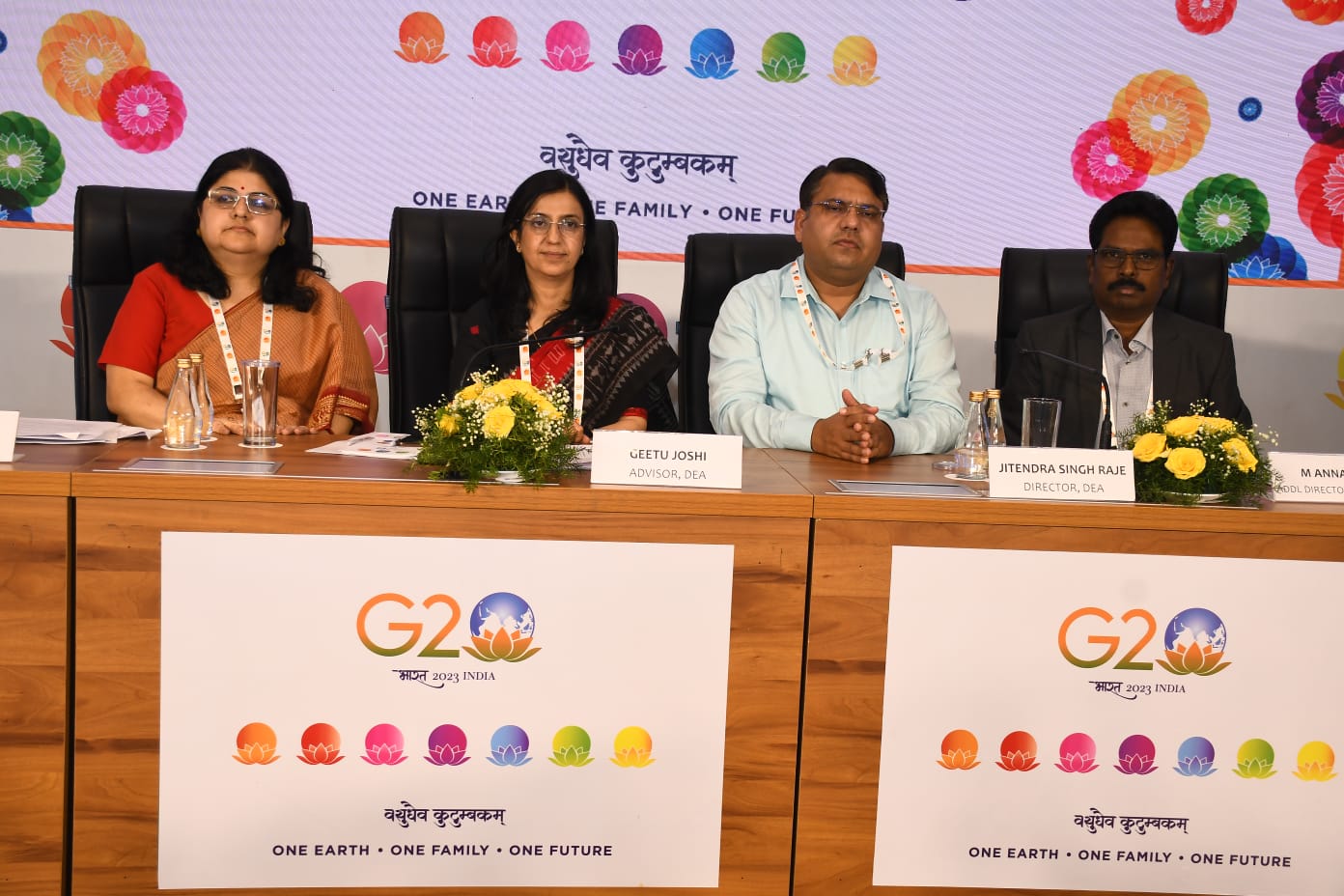Special Service and Features
Governments, IOs, and the private sector should work in collaboration for supporting progress on climate commitments and transition plans
The Third Meeting of the G20 Sustainable Finance Working Group(SFWG)under G20 India Presidencycame to an end today in Mahabalipuram
Posted On:
21 JUN 2023 5:51PM by PIB Chennai
The meeting held from June19-21, 2023 was attended in person by around 100delegates from G20 member countries, 11 invitee countries and 15 International Organisations including OECD, World Bank, Network for Greening the Financial System (NGFS), FSB among others. Many other organisations joined the meeting virtually.
During the three-day meeting, members intensively discussed the deliverables under the three priority areas viz., (i) Mechanisms for mobilisation of timely and adequate resources for climate finance; (ii) Enabling finance for the SDGs; and (iii) Capacity building of the ecosystem for financing toward sustainable development.
The agenda of the 3rd SFWG meeting was to firm up the deliverables as the contribution of the SFWG under the Indian G20 Presidency. For this,adraft deliverables document was shared with the membership prior to the meeting. The deliverables under the identified priority areas consist of recommendationsfor:
- Mechanisms for mobilisation of timely and adequate resources for climate finance
- Policy measures and financial instruments for catalysing the rapid development and deployment of green and low carbon technologies
- Scaling-up the adoption of social impact investment instruments and improving nature-related data and reporting under the G20 Analytical framework for SDG-aligned finance
- G20 Technical Assistance Action Plan Capacity building of the ecosystem for sustainable finance and financing towards sustainable development
- Overcoming data-related barriers to climate investments.
The plenary sessions saw exhaustive discussions and negotiations for finalizing the deliverable document consisting of recommendations. The Presidency with support from the US and China co-chairs, was able to achieve substantial progress in building a common understanding among G20 members on most ofthe issues.
Members highlighted that country-specific circumstances and challenges must be duly recognized for tailored policy actions. Several members underlined that the recommendations should reflect a greater focus on blended finance mechanisms. Conducive regulatory frameworks and efficient use of fiscal resources is necessary for creating an enabling policy environment for attracting climate investments. Additionally, DFIs and MDBs play a pivotal role that act as catalysts for scaling up necessary financial flows. Further, it was broadly concurred that greater international cooperation can help in balancing policy design and transition risks.
To promote sustainability-aligned finance and align more finance with social SDGs, members have agreed that there is a need to leverage MDB finance for making more social impact investment projects commercially viable, promote public-private partnerships in social impact initiatives, create facilities or platforms to finance specific projects, especially for SMEs, among others.Harnessing the role of innovative technologies to develop and scale social impact instruments, considering national priorities, need for greater collaboration amongst various stakeholders through impact policy dialogues, convenings or conferences are some of the other recommendations suggested by the membership.
Improved data and reporting can play a critical role in timely incorporating nature-related risks and opportunities into core decision-making and processes of businesses and financial actors. It has been collectively agreed that there is a need for promoting greater comparability, interoperability, and consistency of nature-related data and reporting considering country specific circumstances. Climate, nature and biodiversity data platforms should collaborate to help stakeholders incorporate nature and biodiversity data into their frameworks and effectively understand nature-related risks and impacts on nature. Capacity building is an indispensable tool that can help build skills and technical capacity of stakeholders to allow for mainstreaming of nature-related aspects into decision making and processes.
Steps should be taken to enhance the capacities and skillsets of stakeholders to identify, understand, and manage sustainability-related risks and be equipped to mitigate these risks, including MSMEs. Capacity building service providers should be encouraged to focuson the most needed sustainable finance areas including transition finance framework, tap digital technologies and platforms and alsoexpand their horizons to cover the needs of EMDEs and MSMEs.
Improved understanding of data and metrics is required to support climate investments and enhance private sector financing. There is a need for Governments, IOs, and the private sector to work in collaboration to improve availability and access to data and methods for supporting progress on climate commitments and transition plans.
The results of the 3rd SFWG Meeting will be further discussed at the 3rd G20 Finance and Central Bank Deputies’ meeting and the 3rd G20 Finance Ministers and Central Bank Governors’ Meeting, which will be held in Gandhinagar next month.
A G20 workshop on policy measures and financial instruments for catalysing the rapid development and deployment of green and low-carbon technologies was organized on 19th June, 2023. The key barriers to financing of climate-tech include the valley of death issue wherein the investments are concentrated at later stages of product development instead of early stages, geographical locations of the projects and their long timelines that add to the risks. Innovative solutions were discussed such as developing technology in domestic markets, and innovative instruments like blended finance and deepening of bonds markets, developing supporting infrastructure, etc.
Another dedicated G20 workshop on transition finance, data and metrics for climate aligned investments and sustainability data issues was organized on 20th June, 2023 and served as an experience-sharing forum for the participants to reflect on the availability of quality data, portfolio alignment of companies with climate and sustainability goals, enabling transition finance pathways, and provide guidance on the upcoming disclosure frameworks. The need for being mindful of country circumstances and local needs was underscored.
Additionally, several Jan Bhagidari events were organized to make G20 discussions more inclusive and people-centric. This included a domestic outreach event on India’s G20 Roadmap to achieve a Sustainable Future at Reserve Bank Staff College, Chennai, a Roundtable onMobilising Climate Finance in India for Mitigation and Adaptation at IIT Madras, a G20 awareness campaign, an awareness programme on RBI Ombudsman Scheme, etc. Additionally, International Day of Yoga (IDY) was celebrated on 21st June, 2023 with an early morning yoga session in Shore Temple complex, a UNESCO word heritage site, which was attended by the delegates and the presidency team.


***
(Release ID: 1934148)
Read this release in:
Tamil